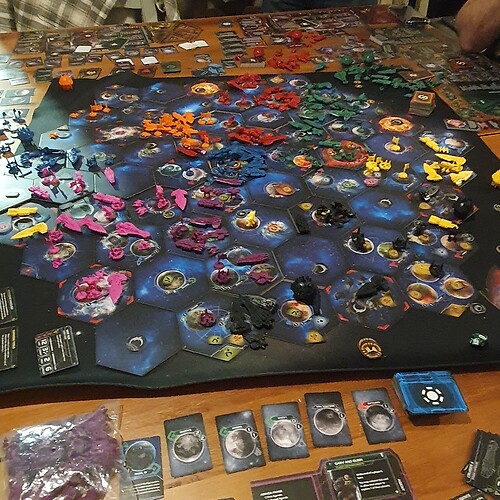My brain insists on calling it the twiglet struggle, much to its own amusement. Of course, I live in a country that doesnt have twiglets so I cant bring a pack along to games night and make everyone else suffer the pun too
Phil Eklund has been ejected from Sweden, he suggests it might be because of his politics. Id like to hear Swedens side
Sweden, that hotbed of fascism.
Probably more to do with him being a massive terf and Sweden being one of the most pro-trans countries in the world.

I mean, I feel bad for Arizona.
States furiously arguing back and forth: “No, you take him.”
So THAT’S why we still have Guantanamo!
Brilliant. Hes likening himself to the people who were oppresed under Mao and Hitler. 
Jesus fucking Christ the arrogance.
Years ago, I read an article on Ars Technics about RISC vs. CISC (this one: https://archive.arstechnica.com/cpu/4q99/risc-cisc/rvc-1.html). To oversimplify, CPUs can implement lots of instructions, which makes it easy to do exactly what you want to do quickly once you find the right instruction, or relatively few, which makes it easy to find whatever instructions the CPU has, but you have to combine several to do what could have been a single instruction.
A similar dynamic occurs when designing rulesets for formal inference: most rules people find intuitive and easy can be decomposed into just a few simple rules, combined in various ways. Back when I was teaching logic, one of the most satisfying sorts of exercises to offer my students was to give them very basic rules to use (which made proofs very long, and kind of boring) and make them prove some of the faster, more intuitive ones, and then let them use that from then on. It invites the student into the system design process, in a way which feels delightfully transgressive and empowering.
It’s also a perfectly good mechanic to use for a game, and I was wondering if anyone can think of a game which does this? I’m thinking about something which lets you combine existing options into composites which do both of them together, and which ideally imposes a cost the more options you have. A simple version would be chess played with just pawns, each of which can move forward, left, right, or back. Each turn, you get a new move, and can either glue it to one of your existing moves, or add it as its own thing. But each turn, you spend time equal to the number of moves you have available, and whoever has spent less time this game takes the next turn. So you might decide to build up something like a knight move out of the basics you start with, but lose the ability to move just one space left.
I feel like a bunch of engine-building type games tend to put people in a position where they have two or three components they always use in series (say, first the thing which turns one black cube into two red cubes, then the thing which turns two red cubes into two gold cubes, which are wild). But I don’t know of one in which such composition is built in, and limiting the total number of options to consider has a mechanic to encourage it.
Just had a long session with 4 people all playing Unconscious Mind for the first time. You can read reviews about it elsewhere to get an idea of how it is played but my ultimate conclusion is that it is beautiful but it’s yet another euro with a couple different says to score points that are sometimes interconnected. I know it sounds reductionist and it doesn’t sound complimentary, but I did ultimately like it. It’s beautiful to look at and has a cool theme. In the end, though, I actually didn’t feel like it had any special new mechanics, just that it does a lot of known mechanics well. I can see it being some peoples’ favorite euro game while also being forgotten by many people in a number of years. It’s late; I hope this makes sense. I’d play it again and would be happy to have a copy in my collection, but my play also doesn’t have me running out to find a copy.
This isn’t entirely on-topic for your question, but I can’t help asking whether you’ve played Andrew Plotkin’s Hadean Lands? When you first start to play it you assume it’s old-school text adventure stuff — go north, get lamp, you know the drill — and at least for me it took a long time to get over the idea that you need to perform sequences of actions step-by-step. Once you’ve figured out the actions needed to accomplish goal X, you can just tell the game to do X, and it re-runs your actions for you, and that saves you lots of time while trying to perform higher-level goals Y and Z. So it seems like that’s related to what you’re looking for. As for costs, I’ll try to refrain from spoilers, but there is a very strong resource-management whiff to the thing.
tl;dr: just go play it. I can’t recommend it strongly enough.
That doesn’t sound much like the dynamic I was thinking of, but perhaps the spoiler-avoidance is relevant. Does sound cool, though! I’m not sure I ever played a text adventure in my youth. Reviewed a couple, I think, but it’s never really been my genre.
Must have been a ten point game? My group insists on 14 points as “the game can be over in only 6 hours” at 10 points. I personally think dragging the game out to 12 hours is something to try to avoid
Yep, 10-pointer.
I do not know the answer to your question about game rulesets …
… but, as a computer architecture nerd just seeing this post, I feel bound to point out that many (maybe most or all?) CISC processors actually implement RISC instructions under the hood because the hardware’s more efficient. Many Intel processors famously have a “pre-decode” stage to convert their instructions to “micro-ops,” which I’ve always taken to mean, “we couldn’t scrap our whole instruction set once we figured out RISC was better, but we couldn’t let those concerns force us to build worse processors.”
I’m sure I’ve glossed over or screwed up some points since I haven’t talked about this stuff in a while, but I couldn’t help myself. Crawling back under my rock; everyone else please go back to talking about board games.
TI is one of those games I’ve always wanted to try and will never have a chance to play. Looks great, though.
Does anyone have any opinions on Nexus Ops?
I’m looking for a martial game that works well for 3 and has fairly low rules overhead, but I already have a few games that could fit that bill in a pinch like Small World, Blood Rage, Inis, etc.
Over heard Nexus Ops compared to the closest we have to a board game version of StarCraft, which would certainly make us happy as lapsed StarCraft fans.


